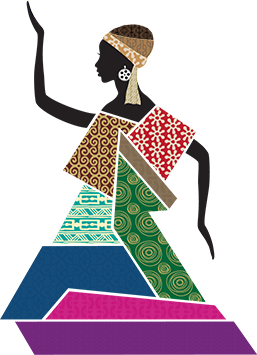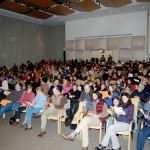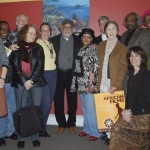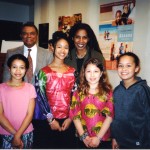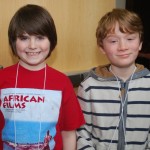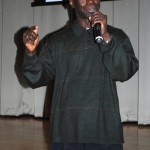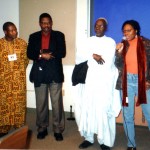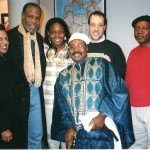A Love Story
by Bobbie Carrie
Twenty-four years ago four people held a film festival. They called it the Cascade Festival of African Films (CFAF). The event featured just four films from Africa, and drew some 400 people, far exceeding their expectations.
These four people—Linda Elegant, Mary Holmström, Michael Dembrow, and Joseph Smith-Buani—shared a love of film and a love for Africa.
Their vision, enthusiasm, and hard work inspired a legacy that continues to thrive. (Learn more about each founder in “The Early Beginnings of the Cascade Festival of African Films” in this issue.) A few statistics about the festival illustrate the enormous impact these four people have made.
CFAF by the numbers
- CFAF has grown over the years to include approximately 80 committee members, contributing their time and support to every facet of the festival planning and execution.
- The yearly audience has grown from 400 people to an average of more than 5,000, with an estimated total audience of approximately 70,000 over the past 24 years.
- The festival has hosted 34 visiting filmmakers (13 women, 21 men), with three filmmakers visiting more than once. Local Ethiopian, Ghanaian, Nigerian, and Somali communities have joined with CFAF to co-host receptions for directors from their country of origin.
- A total of 354 films have been shown, including multiple screenings of some titles. Many of the films have won awards from the American Academy, Sundance Film Festival, FESPACO, Cannes Film Festival, and others.
- Festival films represent 42 African countries, plus the African diaspora (Europe, USA, Mexico, Haiti, Cuba, Uruguay, Guadalupe, and more).
The festival has helped the Portland Community College Library develop one of the largest, if not the largest, African film collections in the Northwest.
Building community
CFAF is unique in the world of film festivals in several aspects. It has remained free to the public, is non-commercial, and was all-volunteer run for the first 20 years. For five weeks every year, including February in honor of Black History Month and the first week in March to celebrate Women’s History Month, the festival becomes one of the most diverse communities in Oregon. CFAF has also continued to hone its offerings, initiating new attractions such as Family Film Day, Student Fest, and a Thursday evening documentary series.
From the first year, the festival established the values and features that remain cherished today. It starts with a commitment to engaging the community. Students in the PCC Graphic Arts program design the festival poster and brochure cover, giving them real-world experience. A rare free event, it has become a magnet for people from all walks of life, a place where audience members are treated with respect. Over the years, it has fostered friendships, inspired relationships, and not only supported the community but helped create it. The festival’s audience spans members of the CFAF committee, the North/Northeast neighborhoods around the PCC Cascade campus, the greater metropolitan Portland area, and colleges and universities throughout the state.
Because of CFAF’s longevity and stability, a second generation of volunteers has become active in the festival. Tatyana Dembrow, daughter of founding member Michael Dembrow and his wife Kiki, was 12 years old when the festival began; she is now a key member of the Executive Committee. Fatu and Joseph Smith-Buani’s children attended the festival during their youth, as well as committee members Cinzia and Mark Holman’s children, Marco and Maya. Penda and Amina Diakité, daughters of long-time committee members Ronna Neuenschwander and Baba Wague Diakité, were born during the early years of the festival and were an integral part of the festival’s Family Film Day activities throughout their childhood and adolescence. Penda is a recent Cal Arts graduate and accomplished film director in her own right. Her early films were shown at CFAF in 2006 and 2013. Her most recent film will be shown at the 25th CFAF in February 2015. Amina is currently a student at PSU and continues to find time to volunteer at CFAF. CFAF Coordinator Tara Foster is nurturing her own festival contributors. Her two young sons, Nolan and Logan, have served as volunteer helpers on Family Film Day since 2011.
Other CFAF facts
- Country sheets and film notes are available for every film to help provide context, background, and additional details on the themes or issues presented.
- After-film speakers and/or the visiting directors give the audience members an opportunity to respond to films through thoughtful, honest and open, and often intense dialogue.
- The films are not Hollywood films; they are truly African, showing the African experience through African eyes and lenses. They hail from all regions of Africa, both rural and urban.
- Festival selections have dealt with difficult issues, including the AIDS epidemic, apartheid, the Arab Spring, civil war, corruption, cross-cultural dilemmas, elections, the environment, famine, genocide, globalization, homosexuality, the legacy of colonization, poverty, and slavery (past and current). These challenges are not unique to Africa, but rather affect countries throughout the world and are a part of the larger human condition. The films portray courage, resilience, dignity, joy, love, laughter, brilliance, music, dance, art, and have introduced us to inspirational heroes throughout the continent.
- The first film shown in 1991 was Camp at Thiaroye, by Ousmane Sembène, who is considered the “Father of African Film.” Sembène died in 2007, but his films remain timeless and popular among film buffs. Throughout the years the festival has shown nearly all of his films, and in 2008 held a special tribute to him. He was notoriously reclusive, granting few interviews throughout his life. Of note is that two CFAF committee members have interviewed him, Michael Dembrow and Dr. Amadou Fofana, professor of French at Willamette University and author of the recently published The Films of Ousmane Sembène. In 2014, the festival held an Ousmane Sembène Retrospective with Dr. Fofana hosting. Sembène has been considered the spiritual father of the festival.
- Other special events over the years have included a symposium with acclaimed Malian director Souleymane Cissé in 2005; the symposium on the African influence in Mexico with director Raphael Rebollar Corona and keynote speaker Maria Elisa Velazquez in 2006; Somali Saturday: The Challenges of New Americans, a discussion with Director Fathia Absie and members of the Somalian community in 2012; and, in 2002, a surprise visit from actor Danny Glover.
Congratulations and thank you, CFAF
Inspired by their love of film and of Africa, Linda, Mary, Michael, and Joseph have fostered a love for African film among the greater Portland community. All who have been a part of the Cascade Festival of African Films—the original four founders, the many volunteers over the years, the faithful audience members, and the dedicated sponsors—can be proud of their participation this past quarter century. A special thank you is due to Portland Community College, whose support has been invaluable.
The festival continues as a unique experiment–a gift to the community in which we can engage a visual history of Africa’s past and explore its promise for the future.
- CFAF audience 2009
- Filmmaker Haile Gerima with CFAF Committee members, 2010
- CFAF mailing party, 2011
- Amina and Penda Diakite with Dr Algie Gatewood and filmmaker Beti Ellerson, 2005
- Logan Foster and Friend greet people at Family Film Day, 2014
- Prof. Amadou Fofana speaks about the Father of African Film, Ousmane Sembene
- Filmmaker Souleymane Cisse of Mali (in white robe)) discusses films with students during CFAF symposium at Washington State University in Vancouver, 2005
- Danny Glover (in scarf) with CFAF committee members, 2002
January 2015 Newsletter
- CFAF celebrates its 25th anniversary with a kickoff gala and other special events
- The early beginnings of the Cascade Festival of African Films
- A Love Story
- Fast Forward
- Special for the Silver Anniversary: Founders’ Top 10!!!
- Staff Changes
- Movies in the Park goes to Africa!
- 25th CFAF Endowment Fund Campaign
- Is your Membership in CFAF current?
